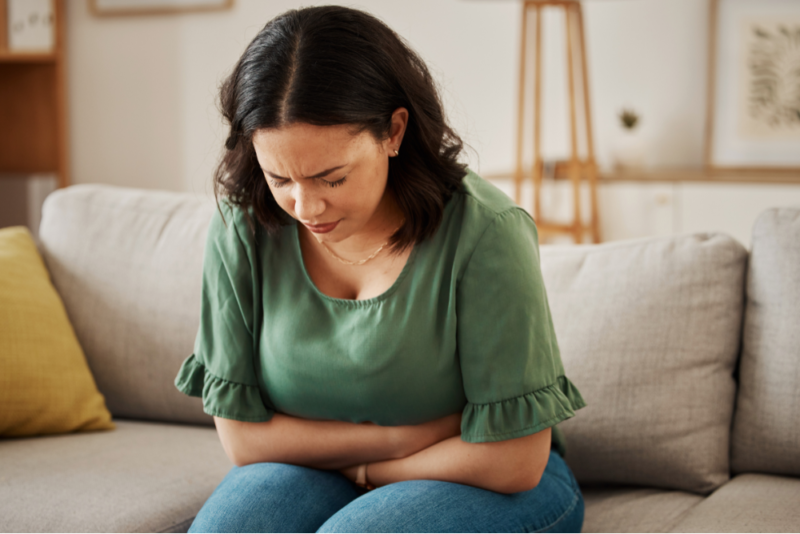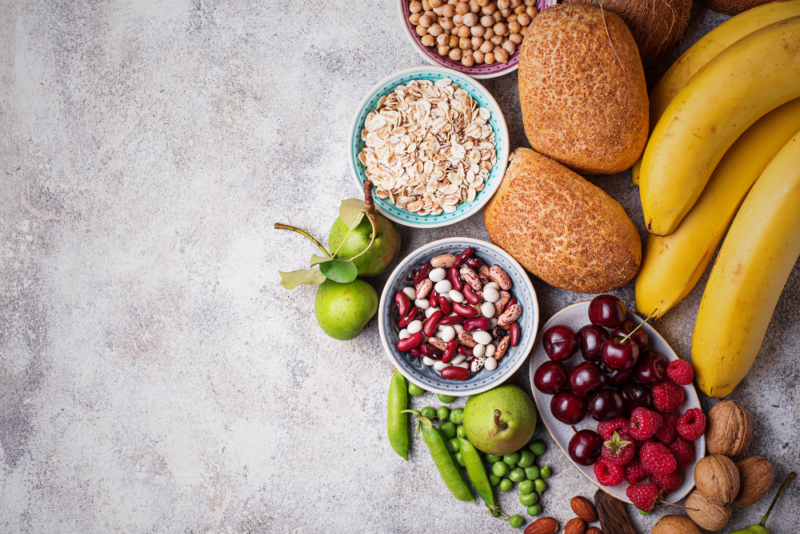If you happen to assume a single bout of stomach ache, fuel, bloating, diarrhea or constipation can break your day, attempt having it’s a each day, or near-daily, incidence. That’s what most individuals who’ve irritable bowel syndrome (IBS) battle with.
While you concern working errands, sitting by way of an extended assembly or going to somebody’s residence for dinner since you is likely to be additional gassy or, worse, urgently have to run for the toilet, that’s a profound quality-of-life situation.
For years, a analysis of IBS got here with recommendation to surrender dairy, eat extra fiber or to attempt to scale back stress. Happily, we’ve come a great distance. Whereas many people with IBS are lactose illiberal, and an excessive amount of stress may give anybody some gastrointestinal misery, because of the gut-brain connection, we now know that — paradoxically — many varieties of fiber can really set off IBS signs. Particularly, FODMAPs.

What are FODMAPs?
FODMAPs, in any other case often known as Fermentable Oligo-, Di-, and Monosaccharides and Polyols, are extremely fermentable sugars and dietary fibers that are typically poorly absorbed within the small intestines of many individuals with IBS. FODMAPs then journey to the massive gut the place they act as “quick meals” for intestine micro organism, inflicting extreme fuel and bloating. They’ll additionally alter the fluid stability within the giant gut, inflicting diarrhea, constipation, or each.
The irony is that oligosaccharides are a kind of prebiotic fiber, which in most individuals has the symptom-free good thing about feeding the wholesome micro organism and different microbes within the intestine microbiome. An ideal instance of why one eating regimen doesn’t match all.
Because of analysis out of Monash College in Australia, not solely will we learn about FODMAPs, however we’ve got a approach to determine which meals are inflicting signs. It begins with avoiding high-FODMAP meals for a number of weeks, together with:
- Milk, yogurt and some tender cheeses (excessive within the disaccharide lactose)
- Wheat, rye and barley (excessive in fructans, a kind of oligosaccharides)
- Fruits which have a better fructose-to-glucose ratio (together with apples and pears)
- Different meals and condiments excessive in fructose (a monosaccharide)
- Meals excessive in sugar alcohols (polyols resembling xylitol and sorbitol)
- Beans and lentils (excessive in galacto-oligosaccharides)
- Sure greens, together with the cruciferous veggies and the onion household (oligosaccharides)

Can the low-FODMAP eating regimen assist IBS?
Most individuals with IBS begin to see symptom reduction after a number of days on a low-FODMAP eating regimen, though typically it takes a number of weeks to make sure. After two to a few weeks eliminating high-FODMAP meals, if there’s a noticeable discount in signs, the following step is to “problem” every sort of FODMAP to study which meals, in what quantities, trigger issues. The final word aim is to have the ability to keep away from signs whereas having fun with as diverse a eating regimen as doable.
So in case you assume you may need IBS, must you give the low-FODMAP eating regimen a whirl? In a phrase, no. There are a variety of gastrointestinal problems which have comparable signs as IBS, and a few are fairly critical. It’s at all times essential to get a correct analysis.
Whereas IBS impacts high quality of life, it doesn’t trigger bodily injury to the intestines. The identical can’t be mentioned for inflammatory bowel illness (IBD), an umbrella time period for Crohn’s illness, ulcerative colitis, and a few much less widespread associated situations. IBD could cause ulcers and irritation to the intestinal lining, which is kind of critical.
Additionally, signs of celiac illness could be mistaken for IBS. Gluten is a protein, however the grains that comprise gluten (wheat, rye and barley) additionally comprise oligosaccharides. So some individuals who assume they’ve celiac illness or non-celiac gluten sensitivity even have IBS. They’ve an issue with gluten-containing grains, however with the fiber, not the gluten itself.
There have been research during which individuals who assume they’ve non-celiac gluten sensitivity (which in contrast to celiac illness, doesn’t injury the gut) are secretly given gluten. Many, typically most, don’t have any signs — then they do have signs after they’re given fructans.
Once more, all it is a main cause why it’s essential to get an actual analysis.

How IBS is identified
Whereas there’s no take a look at for IBS, the American School of Gastroenterology (ACG) says physicians could make a analysis primarily based on what signs somebody has, and what signs they don’t have. Signs resembling blood within the stool, fever, or unexplained weight reduction strongly counsel that what’s happening isn’t IBS, and would warrant testing.
The one take a look at that’s really helpful by the ACG is a blood take a look at for the antibodies which are usually current if somebody with celiac illness eats gluten — as a result of blood checks are comparatively non-invasive. If you happen to haven’t been examined for celiac illness, it’s essential to have been consuming gluten-containing meals for at the very least 6 to eight weeks earlier than you get examined, in any other case the take a look at might produce an unreliable end result.
Additionally, I’ll say from my expertise working with shoppers who’ve IBS, is that it may be difficult to DIY the low-FODMAP eating regimen. Lots of my shoppers reached out to me as a result of they began the eating regimen and realized, “Ack…I need assistance!”
Additionally, you probably have IBS and are contemplating the low-FODMAP eating regimen, and have a historical past of disordered consuming, it’s actually essential to have help from a registered dietitian nutritionist (RDN) who has expertise in each intestine well being and consuming problems whereas following the eating regimen (that may be true for ANY elimination eating regimen).
In order for you extra info on my IBS Administration Program, you could find that right here.
Carrie Dennett, MPH, RDN, is a Pacific Northwest-based registered dietitian nutritionist, journalist, intuitive consuming counselor, writer, and speaker. Her superpowers embrace busting diet myths and empowering men and women to really feel higher of their our bodies and make meals decisions that help pleasure, diet and well being. This publish is for informational functions solely and doesn’t represent individualized diet or medical recommendation.
Searching for 1-on-1 diet counseling? Be taught extra about her Meals & Physique, IBS administration, and diet counseling applications, and guide an intro name to see if this system is an efficient match, and if we’re a superb match!
Need unique content material on diet, well being, eating regimen tradition and extra, plus critiques of diet and well being journalism? Subscribe to my Meals Noise publication! 📣